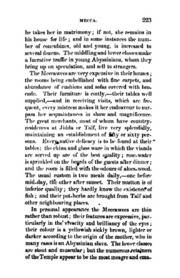Table Of ContentMecca
arcan
Wetarpara Joykcishn, Public Libragy
Govt. of West Beogad
“MECCA.
Near the gat Bab es Salem, a rew
daily take their seat, with their paper and
ready to write for any applicant, letters, accounts,
contracts, amulets, billet-doux, or any similar do-
cuments. They are principally employed by the
Bedouins, and demand an exorbitant remuneration.
One species of inviolable property belonging to the
Mosque are the flocks of wild pigeons with which
Mecca abounds, and which nobody dares venture to
kill. Several small stone basins are regularly filled
with water for their use ; and as it is considered an
act of piety to feed them, there are women who ex.
pose corn and dhourra for sale on small straw mats,
and why occasionally embrace the opportunity of
intriguing with the pilgrims, under the pretence of
selling them corn for the sacred pigeons.
‘The service gf the’ Temple employs avast number of
people, consisting of khatibs, imams, muftis, muczzins,
ulemas, eunuchs, lamplighters, metowals or guides,
with a host of other mgnial servarits, all of whom re-
ceive regular pay fromthe inosque, besides their share
of the preseste made to it by the hajjis. The first of-
“cer ia the Maib cl Haram or guardian, who keeps
: keys of theKaaba, and superintends the repatrs
tie’ boating. Barckhardt says he was one of the
-y lay freely about tt
fad Their number exe,
299 HEJAZ.
most of them are negroes or copper-coloured Indians.
The aga is & personage of great importance, entitled
to sit in the presence of the pasha and the sheriff.
The revenue of the mosque is considerable, al-
though it has been deprived of the best branches of
its income. There are few towns or districts in the
Turkish empire in which it dovs not possess pro-
perty in land or houses; but the annual amgunt is
often withheld by the provincial governors, or di-
ininished by the number of hands through whieh it
passes. Formerly the sultans of Egypt and Constan-
tinople sent it large sums every year; but at pre-
sent it is reduced to a state of comparative poverty.
Notwithstanding the stories about its riches, it pos-
sesses no treasures except a few golden lamps. ‘The
history of the Qeitullah has occupied the pens of
many learned Arabs ; but in its constguction it dif-
fers little from many other buildings of the same kind
in Asia. Those of Aleppo, Damascus, and Cairo,
are exactly on the same plan, with an arched co-
fonnade round an open square.
The inhabitants of Mecea may all be called fo-
reigners or the offspring of foreigners, txcept a few
Hejaz Bedouins or their deseendants, who have set-
Ued there. Though a mixed population, they have
nearly the same manpers, and wear the same dress ;
so little tenacious are they of their national customs.
There are few families in moderate circumstances
that do not keep slaves; the male‘and fenmle ser-
vants are negroes ; and must of the wealthier in-
habitants, in addition to their lawful wives, keep
Abyssinian mistresses. It is considered disgraceful
to sell a concubine: if she bears a child, and the
master has not already four legally-married wives,
MECCA. 223
he takes her in matrimony ; if not, she remains in
his house for life ; and in some instances the num.
ber of concubines, old and young, is inereased to
several dozens. The middling and lower elusses make
a lucrative traffic in young Abyssinians, whom they
bring up on speculation, and sell to strangers.
The Meecawees are very expensive in their houses ;
the rooms being embellished with fine carpets, and
abundanee of cushions and sofas covered with bro-
cade. Their furniture is costly,—their tables well
supplied,—and_ in receiving visits, whieh are fre.
quent, every mistress makes it her endeavour to sur-
pass her acquaintanees in show and magnificence.
The great merchants, most of whom have couutry-
residences at Jidda or ‘Taif, live very splendidly,
maintaining an establishment of Sfty or sixty per-
sous. Everygnative delicacy is to be found at their?
tables: the china and glass ware in which the viands
are served up are of the best quality ; rose-water
is sprinkled on the begrds of the guests after dinner ;
and the room is filled with the odours of aloes-wood.
The usual custom is two meals daily,—one before
mid-day, the other after sunset. Their mutton is of
inferior quality ; they hardly know the cxistencd of
fish ; and their pot-herbs are brought from Taif and
other neighbouring places.
In personal appearance the Meccawees are thin
rather than robust; their features are expressive, par-
ticularly in the’vtvacity and brilliancy of the eyes ;
their colour is a yellowish sickly brown, lighter or
darker according to the origin of the mother, who in
many cases isan Abyssinian slave. The lower classes
are stout and muscular ; but the numerous zetajners
of the Temple appear to be the most meagre and ema-

